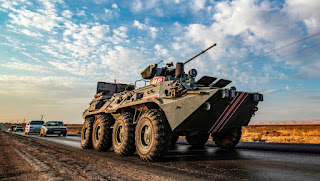Turkey's Presence in Northern Syria
Photo source: The New Arab
By Naveed Qazi | Editor, Globe Upfront
By Naveed Qazi | Editor, Globe Upfront
Turkey has retained a military presence in northern Syria, after it launched its first border operation in August 2016, through Operation Euphrates Shield to fight Islamic State near Turkey’s border, and to also prevent Syrian Democratic Forces (SDF) from advancing further westward.
Turkey completed Euphrates Shield after capturing the city of Al-Bab from Islamic State in March 2017. Turkish allied militia and the Turkish army control these regions. Turkey has launched a total of four of its military operations since 2016. All its major ground operations needed to be carefully deconflicted with Moscow. The last one, in 2019, also required coordination with a chaotic Trump White House. While Trump first gave the green light, he later changed his tune and threatened Turkey with heavy sanctions. Such discord on the American front made Turkish-Russian coordination even more essential for Ankara.
Ankara has even invested in a lot of infrastructural projects in the Euphrates Shield Zone. Infact, the Turkish Lira is already a currency in northern Syria.
In 2017, under the framework of the Astana agreement with Russia and Iran, Turkey began establishing its troop presence in Syria’s Idlib province via the establishment of twelve observation posts manned by the Turkish army. Its supposed aims of the deployment were the prevention of clashes between Assad regime forces, and armed opposition groups that control Idlib, the most powerful being the Hayat Tahrir al-Sham.
But it seems that Turkey’s subsequent incursions into northern Syria have been mostly controversial. In early 2018, it occupied Afrin, which was initially controlled by YPG. Then, in October 2019, Turkey invaded a large swathe of northeastern Syria, previously controlled by the SDF. It has resulted in the displacement of thousands of people, helping its Syrian proxies loot civilian homes and businesses. It was also the Turkish government that settled two hundred thousand Arab refugees from Ghouta, in homes and areas which were once possessed by Kurds.
Kyle Orton, an independent Middle East analyst noted the situation and raised an important point: ‘Unwilling, for political and economic reasons, to use its own troops in significant numbers, Turkey works through former rebel groups that now have no cause beyond the Turkish pay cheque, which inter alia diminishes their incentives to behave well towards the populace.’ This has set up a high degree of lawlessness by these rebels, who create a scenario where many civilians are killed in the crossfire.
Turkey's occupation of northern Syria is assessed very differently by different groups in the region. For Kurds, Turkey’s incursions, and rule have been a disaster. The expulsion of Kurds in places like Afrin and Ras al Ayn, and the settlement of Arab refugees in homes where Kurds once lived is nothing but ethnic cleansing. For Syrian Turkmen, however, the Turkish military presence seems godsend. When it comes to many Sunni Arab Syrians, they view Turkey’s presence in the region as a lesser evil to the return of the Assad regime to these areas. This is the case with several north Aleppo and Idlib provinces.
Domestically, Ankara has used the Syrian conflict as a pretext to suppress the rights of the Kurds living in Turkey as well and has limited their parliamentary representation to secure a landmark constitutional reform in 2017.
Many rebel militias have now joined the Turkish constituted, Syrian National Army. It reflects the expression of their loyalty to Turkey so that they overthrow the government in Damascus and take control of Syria one day.
According to Nicolas Heras, director of government relations at the Institute for the Study of War, Turkey has ‘set the foundation for a long-term presence in northern Syria similar to its presence in Cyprus.’ Idlib seems to be the first territory that the world should likely expect to be incorporated as if it is a de facto part of Turkey. It will result in a threat to long-term stability in the region.
Heras further went to comment in an interview with The New Arab: ‘all-in-all, the Turkish-controlled areas of northern Syria are a patchwork of regions ranging from tightly managed, de facto extensions of Turkish provinces, to chaos zones ruled by predatory Syrian rebel warbands, to an al-Qaeda safe haven.’
In recent months, Erdogan increased his threats about a new military invasion in northern Syria, in the cities of Tel Rifaat and Manbij.
In foreign policy terms, Turkey’s military operations in Syria have resulted in increasingly tense relations with the United States. Washington’s support for the Syrian Kurds has alienated Ankara to a deeper extent. At the same time, Ankara’s involvement in Syria has also given Turkey new leverage over the EU when it comes to the management of refugee inflows.
Turkey’s involvement in Syria has also equipped it with new tools for conducting a more aggressive and nationalistic foreign policy. It also means that ISIS does not present an existential threat to Turkey the way the PKK does. Ankara always welcomed jihadi infiltration of Syria by opening its borders wide, to make Syria fall to bits, reflecting a new Ottoman hegemony. After all, these jihadists were the most effective fighters against Turkey’s main enemies in Syria: the Assad regime and secular Kurdish nationalists.




Comments
Post a Comment
Advice from the Editor: Please refrain from slander, defamation or any kind of libel in the comments section.